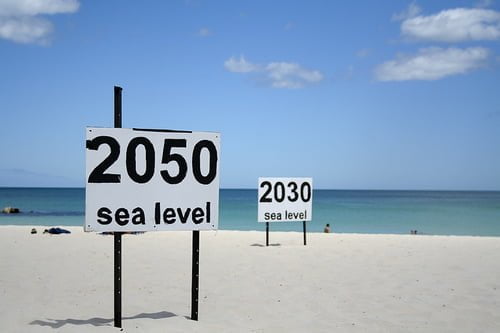Sea levels worldwide are rising faster than predicted as a result of climate change, NASA scientists said.
According to the latest satellite measurements from NASA and its partners, seas around the world have risen an average of nearly 3 inches since 1992, with some locations rising more than 9 inches due to natural variation.
What’s more worrying is that scientists said an unavoidable sea level rise of at least several feet is coming, The Guardian reported.
At a news conference Wednesday (August 26), NASA officials described a new computer visualization of sea level change incorporating data collected by satellites since 1992, which reveals changes are anything but uniform around the globe.
This video by NASA tells about the causes of sea level rise and how sea level has changed over the last two decades as observed by the Jason series of satellite missions.
“People need to be prepared,” Josh Willis, an oceanographer at the agency’s Jet Propulsion Laboratory in Pasadena, Calif., said on a conference call. “We’re going to continue to have sea level rise for decades and probably centuries.”
The new numbers up the stakes for coastal communities from Miami to Tokyo to Dhaka, the low-lying Bangladeshi capital where more than 14 million people live. NASA’s projections are on the high end of the 1- to 3-foot increase estimated two years ago by the Intergovernmental Panel on Climate Change, a United Nations-organized group that’s considered the world authority on climate science.
In Greenland and Antarctica, “the data collected over the last few years make me more concerned about rapid decay of ice sheets,” Eric Rignot, a University of California-Irvine glaciologist, said on the call. “This is not a futuristic scenario.”
Uncertainties remain over how fast polar ice and glaciers will melt, and natural variations mean the impact will differ around the globe, researchers said. In parts of the Pacific Ocean off the West Coast, sea levels have risen more slowly and in some cases decreased, though they are likely to catch up with the increases elsewhere in coming decades, Mr. Willis said.
Negotiators from more than 190 nations are trying to reach an agreement this year, committing all countries to rein in pollutants blamed for climate change. While that won’t reverse warming that’s leading oceans to rise, negotiators are aiming to keep the increase to no more than 3.6 degrees Fahrenheit by the end of the century.
Earlier this March, The Senate’s Standing Committee on Science and Technology issued a letter to Prime Minister Nawaz Sharif earlier this week, expressing fears of the seriousness of sea intrusion along the coastal areas of Sindh and Balochistan which can result in the sinking of Badin and Thatta in a period of 30 years, followed by Karachi.
The letter stressed that if the matter was not treated urgently, Karachi could sink come 2060.
It also demanded of the Ministry of Water and Power, Navy, National Institute of Oceanography and other national institutions to carry out research studies to prevent such a situation from arising.


















